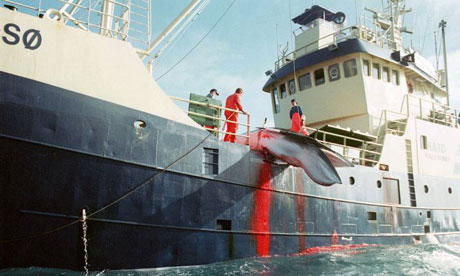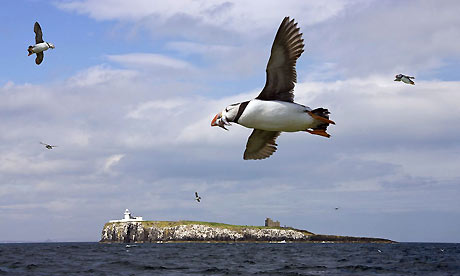· Fisherman deny whale meat market has collapsed
· Oil price blamed for restricted hunt
- guardian.co.uk,
- Friday August 22 2008 15:07 BST
- Article history

A minke whale is hauled onboard a Norwegian whaling ship in this file photograph from 1999. Photograph: John Cunningham/Getty
Norway will not catch enough whales to meet its quota this year, in what environmentalists are claiming is proof that the nation should abandon the activity completely.
Since the whaling season started on April 1, fishermen have caught around half the number of animals allowed by the authorities – 533 common minke whales out of a quota of 1,052.
The season ends on August 31 and fishermen recognise they will fall short. "I don't think we will do it," said Bjoern-Hugo Bendiksen, chairman of the Norwegian Whalers' Union.
Conservation groups say the catch came short because Norwegians' taste for the mammal has declined. "This shows that people don't want to eat whale meat anymore. The market is not there," said Truls Gulowsen from Greenpeace. "The Norwegian government should stop supporting a dying industry and apply the 1986 international moratorium on whaling."
Fishermen deny that falling demand is behind the low catch. "We were able to meet the quota in the two best areas for whaling, around [the Arctic archipelago of] Svalbard" and along the northern coast of Norway, explained Bendiksen, who caught 23 animals this season.
Instead, Bendiksen claims boats have intentionally avoided the hunting areas that are further away, such as the waters around Jan Mayen, an island 600 miles west of the Norwegian mainland. "Only one boat went there this season. It's a long, dangerous trip and it's very expensive because of the increased fuel costs. So it's not worth the risk," he said.
According to official regulations fishermen have three weeks from the moment they catch a whale to deliver it to a processing plant onshore. But "processing plants don't have enough capacity to deal with the meat," thus limiting how much whalers can catch, claims Bendiksen.
Norway resumed commercial whaling in 1993, despite an international moratorium put in place in 1986 to protect the species from extinction. Only one other nation, Iceland, has followed suit, in 2006. Japan allows whaling for scientific reasons, although a large number of whale steaks are found in fish markets every year.
Norway's whale catches have been declining in recent years. In 2004 fishermen hunted 639 animals from a total quota of 796. Last year they caught just 597, out of a quota of 1,052 – the highest quota allowed since 1993. Around 30 ships were involved in this year's hunting season.
Conservationists have long argued that all forms of whale hunting should be banned because it is cruel and stocks are too low for hunting to be sustainable. But Norway defies the ban because whaling "has high political status, even though it's a marginal industry," according to Gulowsen.
"It's a symbolic issue for the government, a way to show its independence from the international community when it comes to controlling its natural resources," he said.
For many Norwegians, especially for those living in the Arctic north where whaling is considered a normal economic activity, eating whale is as ordinary as eating cod or salmon. Whale steaks are available at supermarkets and are served in restaurants.
Norway hunts only one type of whale, the common minke whale, which is considered as "threatened with extinction" according to Cites, the Convention on International Trade in Endangered Species of Wild Fauna and Flora, which bans its international trade.
The common minke whale is viewed as "near threatened" according to the Red List of the IUCN, the International Union for Conservation of Nature, the second lowest step on its "Red List", its classification of endangered species. In August, the IUCN said common minke whales, along with other big whales, were slowly recovering from the threat of extinction thanks to the 1986 moratorium.




